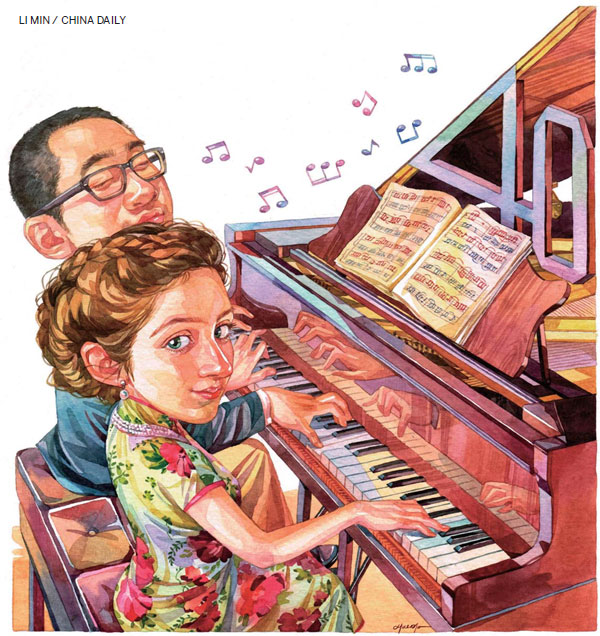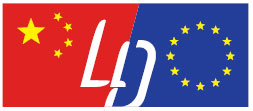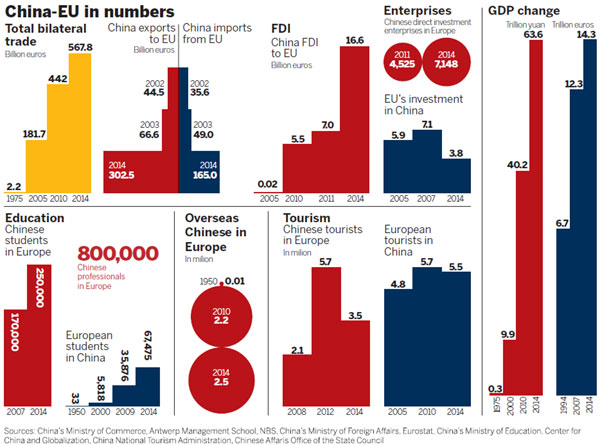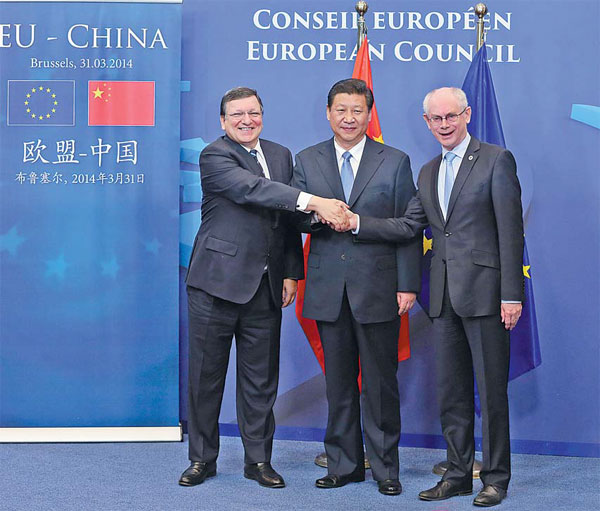Two-part harmony
Updated: 2015-05-01 08:03
By Fu Jing(China Daily Europe)
|
|||||||||||
China and Europe celebrate, but are they singing from the same song sheet?
In 1975, when most Chinese families were struggling to keep the wolf from the door and Europeans enjoyed the kind of lifestyle that many Chinese do now, Beijing and Brussels wooed each other.
Their coming together stemmed from their dissatisfaction with the geopolitical rivalry between the Soviet Union and the United States. After 40 years of diplomacy, Europe and China have changed enormously.

By and large, Chinese can feed themselves and go abroad in their millions for work or travel. Many struggle to lose weight and try to keep fit by adopting a healthier and more active lifestyle.
The European Union has evolved from a community of several powers in Western Europe in 1975 to a union of 28 countries and a population of 500 million.
The EU's eastward integration process is still on, though the situation in Ukraine is problematic. China has expanded its westward policy by launching Silk Road initiatives that would tie China more closely with other countries in Asia, as well as East Africa, the Middle East and Europe.
When Beijing and Brussels hold ceremonies to mark the 40th anniversary of their relationship on May 6, Chinese and European leaders are expected to endorse what both sides have achieved in four decades and send new signals on how to improve the partnership.
In the process of implementing their respective westward and eastward strategies, China and the EU, viewed as distant acquaintances by some European scholars, should reacquaint themselves with each other and try to find more common ground. Beijing has undertaken such efforts in recent years.
It has already staged cultural events and performances to let Europeans know that China has always valued peace and will continue to do so. Posters of such events have been put up in the streets of Brussels, and more events will be organized to mark the significance of the occasion throughout the year.
On May 6, Federica Mogherini, high representative of the European Union for Foreign Affairs and Security Policy and vice-president of the European Commission, will attend a celebration in Beijing and hold her first strategic dialogue with her Chinese counterpart Yang Jiechi.
In Brussels, Jean-Claude Juncker, president of the European Commission, will attend an event co-organized by the Chinese mission to the EU and the European External Action Service.
In early June, Beijing and China are scheduled to hold the sixth round of investment treaty talks with the hope of achieving tangible results. A positive outcome could pave the way for free trade agreement negotiations on both sides.
Premier Li Keqiang will fly to Brussels to attend the EU-China summit, endorsing mutual development priorities and promoting a partnership of peace, growth, reform and civilization, which was proposed by President Xi Jinping when he visited the EU last year.
Chinese ambassador to the EU Yang Yanyi says several things are of historic significance, including Xi's visit and his ideas on the bilateral relationship.
She says it is worth remembering that China's then foreign minister Qiao Guanhua held talks with the Vice-president of the European Economic Commission Christopher Soames on May 6, 1975 and reached a consensus on establishing diplomatic relations between China and the commission. At that time, she had just graduated from university and begun her diplomatic career.
Another milestone is 2003, when Brussels and Beijing set up a comprehensive strategic partnership.

Apart from mutual political recognition, the EU and China have both benefited from each other economically because of their position in the global industrial chain. Partly due to Europe's knowledge, technologies, management, capital and market, China has become the world's biggest exporter, though this pattern is changing.
All these connections and alliances have led to flows of people. The former BBC journalist Alex Kirby says that in 1975 Europe could only imagine China. Now there are 70 direct flights linking China and Europe, and new land routes are emerging. Over 40 years both parties in the relationship have had myriad successes to celebrate but, as with any close relationship, there have been disagreements and tensions. Trade has been a fertile ground for such disputes, and both sides say they have become more common.
China has been rankled by what it regards as the aggressive way the EU has treated its textile and solar panel exports, particularly since China joined the World Trade Organization in 2001.
China has also been irked by what it regards as a tendency by the EU to too quickly fall in with the United States when it comes to big political decisions. It supported Washington when the US imposed economic sanctions on Beijing in 1989, though diplomatic relations normalized in 1992. Brussels and Washington agree on retaining a weapons embargo on China or giving the country market economy status.
It should also be remembered that on May 7, 1999 NATO accidentally dropped five bombs on China's embassy in Yugoslavia. Four Chinese nationals died and 21 were wounded.
Of more present concern are matters economic, and one of these is currencies. Chu Fulin, president of the China Institute for Reform and Development, predicts that over the coming 10 years the euro will become more stable and the renminbi more international. Paul de Grauwe, a professor at the London School of Economics, has predicted that the currencies in line to become world currencies are the renminbi, then the euro.
Brussels will support Beijing as a way to decrease the strength of the dollar in the international financial regime. This stance has given China and other emerging economies more say in global financial reforms since the financial crisis of 2008. European countries seeking to become founding members of the China-led Asia Infrastructure Investment Bank is an example of such support.
In the coming decade, China will need to increase its educational competitiveness to attract more young Europeans to China. It will also need to improve its standards of higher education and build more universities. Apart from the UK, France and Germany, those countries with a population of 10 million people should be regarded as competitors for each province or big city in China.
Of course, all of this takes a lot of time and energy, but if China wants its soft power to match its global influence and economic clout, this is a must.
The Europeans have set a good example for the Chinese. Regarding this, the Chinese writer Tammy Liu has said education and culture are essential bridges for Chinese and Europeans to build.
Meanwhile, Beijing and Brussels will be naturally linked together because of a daunting challenge they both face. When both sides established diplomatic relationship, Europeans had already started to tackle environmental pollution and focus on development pattern changes by restricting growth.
China now faces this challenge. If Europeans can share their experience and transfer their cutting-edge technologies, all will be winners. In his contribution to this special issue, the EU Ambassador to China Hans Dietmar Schweisgut, who was in the US preparing his thesis for master's degree when Beijing and Brussels shook hands in 1975, agrees.
Apart from matters relating to currency, education and pollution it is likely that more Europeans and Chinese will be able to travel by high-speed train between major cities in China and Europe.
Of course, Beijing may have such a vision in mind as it connects Beijing and Moscow by high-speed rail. If Europeans are alive to such proposals, it will be easier to avoid the relationship falling into a rut and to bring Beijing and Brussels closer together.
fujing@chinadaily.com.cn
|
President Xi Jinping with Herman Van Rompuy (right), president of the European Council, and Jose Manuel Durao Barroso, president of the European Commission, during Xi's visit to Brussels last year. Pang Xinglei / China Daily |

(China Daily European Weekly 05/01/2015 page1)
Today's Top News
Protest against police violence expands to NYC
Milan tightens security ahead of Expo opening
Chinese scientists discover 'batman dinosaur'
China trainmakers seek control of Bombardier's rail unit
US Senate rejects bid to toughen Iran nuclear review bill
New Zealand voices dismay at executions in Indonesia
China hits out as Abe visits the US
No hiding place overseas for fugitive officials
Hot Topics
Lunar probe , China growth forecasts, Emission rules get tougher, China seen through 'colored lens', International board,
Editor's Picks

|

|

|

|

|

|







